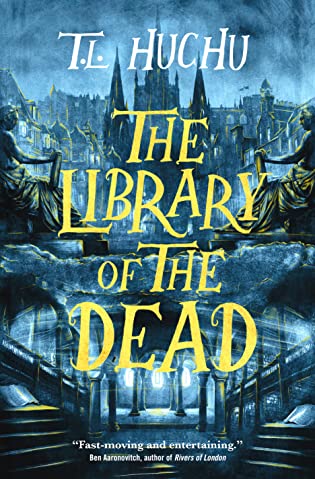 The Library of the Dead (Edinburgh Nights, #1) by T.L. Huchu
The Library of the Dead (Edinburgh Nights, #1) by T.L. Huchu Format: audiobook, eARC
Source: supplied by publisher via Edelweiss, supplied by publisher via NetGalley
Formats available: hardcover, paperback, ebook, audiobook
Genres: fantasy, post apocalyptic, urban fantasy
Series: Edinburgh Nights #1
Pages: 336
Published by Tor Books on June 1, 2021
Purchasing Info: Author's Website, Publisher's Website, Amazon, Barnes & Noble, Kobo, Bookshop.org
Goodreads
Sixth Sense meets Stranger Things in T. L. Huchu's The Library of the Dead, a sharp contemporary fantasy following a precocious and cynical teen as she explores the shadowy magical underside of modern Edinburgh.
When a child goes missing in Edinburgh's darkest streets, young Ropa investigates. She'll need to call on Zimbabwean magic as well as her Scottish pragmatism to hunt down clues. But as shadows lengthen, will the hunter become the hunted?
When ghosts talk, she will listen...
Ropa dropped out of school to become a ghostalker. Now she speaks to Edinburgh's dead, carrying messages to the living. A girl's gotta earn a living, and it seems harmless enough. Until, that is, the dead whisper that someone's bewitching children--leaving them husks, empty of joy and life. It's on Ropa's patch, so she feels honor-bound to investigate. But what she learns will change her world.
She'll dice with death (not part of her life plan...), discovering an occult library and a taste for hidden magic. She'll also experience dark times. For Edinburgh hides a wealth of secrets, and Ropa's gonna hunt them all down.
My Review:
If I had to describe this story – and I do – I’d start out by saying this is very much a dark, post-apocalyptic fantasy, where that darkness is sometimes so impenetrable that this is a world where the light at the end of the tunnel is ALWAYS an oncoming train, and the situation is always darkest just before it turns completely black.
At the same time, it’s also urban fantasy, complete with a magic-wielding and very amateur detective and a huge mystery to be solved. But the urban in this fantasy, while it is still recognizably Edinburgh, it’s not exactly any version of Edinburgh that we know – and not just because of the magic.
See paragraph one and the reference to post-apocalyptic. Although the technology makes it seem like this Edinburgh isn’t all that far into the future, it’s also clear that some serious shit went down in the not too distant past – or not too far back along the path that is now trending towards hell while being carried along in that handcart.
Ropa Moyo is the reader’s guide and avatar in this brave new/old world. Or, at any rate, Ropa is brave while we’re sitting on our comfy couches quivering at all of the risks she takes – and especially the risks that nearly take her.
Her world is both new and old, as whatever turned our world into hers has changed everything to the point where 70s and 80s TV shows – which are still broadcast and viewed – show Ropa a world that looks like a paradise of abundance compared to the time and place she now lives.
It’s also an old world, because the “event” – whatever it was – if it was a singular event and not just a general trend hellwards – has brought back not only ghosts and the old magic needed to communicate with them and take messages from them – but also brought out all of the old magical beings, especially the evil ones – that made living beside creepy places a real peril and “may you live in interesting times” a really, really serious curse.
But the fault, the truly big evil, the really serious evil, is, as always, not in our myths and legends or, but rather as Shakespeare so famously said, “not in our stars but in ourselves.”
And only Ropa Moyo seems ready and willing to fight it.
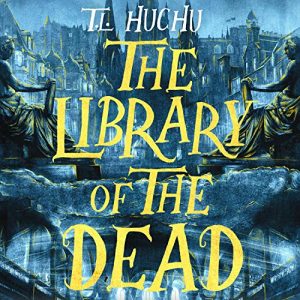 Escape Rating A: The Library of the Dead is fantasy that is so dark it tips all the way into horror at more than one point, so if you prefer your horror-adjacency to not be quite so on the nose, so to speak, then this can, at points be a hard read – although absolutely worth persevering through.
Escape Rating A: The Library of the Dead is fantasy that is so dark it tips all the way into horror at more than one point, so if you prefer your horror-adjacency to not be quite so on the nose, so to speak, then this can, at points be a hard read – although absolutely worth persevering through.
If only to see just how Ropa manages to persevere through in spite of the odds very much stacked against her.
In fact, I have to say that I had the weirdest kind of approach/avoidance reaction to reading this book, whether in print or on audio. Actually I listened to most of this one and the reader was fantastic and if you have the time I highly recommend it.
Even though listening does highlight the “two nations divided by a common language” thing on more than one occasion.
There were many points where the horror aspects, or Ropa’s temporary near-helplessness in the face of either the situation in general or those aspects in particular, made me want to stop listening. At the same time, I was so completely stuck into the story that I felt compelled to keep going.
It was kind of a different version of a train-wreck book. It’s not that the book was horrible, but that the things that happen within it were horrible in one way or another but I absolutely couldn’t turn my eyes or my mind away. It was the whole “watching yucky things ooze” kind of fascination, but I was absolutely fascinated. And definitely riveted. Also, there was plenty of ooze.
One of the things that drove me nuts was that I still don’t know exactly what happened that tipped this version of the world onto the path into hell. SOMETHING definitely happened, but I don’t know what. Not that once the tip happened the hellish snowball hasn’t picked up plenty of speed through purely human pushing, but there was an EVENT in the past and I didn’t grasp what it was.
Maybe in the next book, Our Lady of Mysterious Ailments, sometime next year. I can hope!
What makes this story work, and keeps the reader turning pages at an ever increasing rate, is Ropa. We’re inside her head and she’s telling her story, which does, now that I think about it, mean that the reader knows she survived from the beginning. But honestly her situation gets so grim at points that it completely slipped past me. Also survival alone is insufficient.
Ropa is a ball of contradictions. She is very young, but at the same time she is the primary breadwinner for her tiny family. Ropa’s ghostalking (barely) brings in enough money to pay the rent on the land under their small caravan, feed her grandmother, her little sister and herself, and pay for her gran’s medicine and her sister’s school fees. She’s walking a tightrope every second, knowing that a bad day or bad luck can put them all behind in a way that she may not be able to recover from.
If the difference between “poor” and “broke” is that broke is temporary while poor isn’t going to change anytime soon without a miracle, Ropa is all too aware that her family is poor in material goods but rich in love and that she’ll do whatever she has to in order to keep them together.
But – huge, giant but – Ropa loves her grandmother and can’t imagine a life without her. So when gran tells her to help one of the dead for free, even though Ropa knows it will set the family back financially, she does it anyway. And everything that happens after that, good and bad, is because she was doing someone a favor because gran asked her to. She learns terrible things, she uncovers horrible secrets, she saves herself and does her best to save some others, and she learns she’s way more of a magic-user than merely a ghostalker.
And it ends with both the hope and the fear of things to come, because when there’s big evil, there’s generally an even bigger evil hiding behind it. With the help of her friends, the Library of the Dead, her fox-familiar and her own sheer nerve, roiling guts and self-educated brain, Ropa will take it all on. Tomorrow. After she gets the bills paid.
It’s going to be another EPIC adventure. .Just like this one.

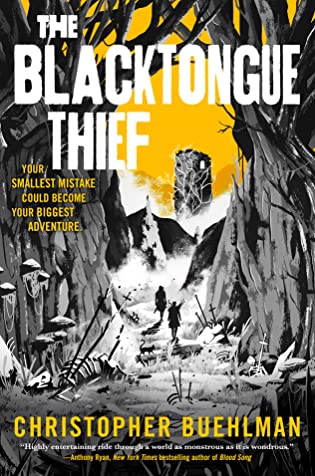 The Blacktongue Thief (Blacktongue, #1) by
The Blacktongue Thief (Blacktongue, #1) by 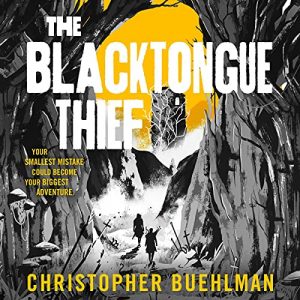
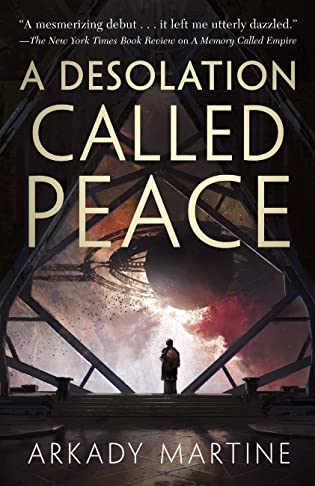 A Desolation Called Peace (Teixcalaan, #2) by
A Desolation Called Peace (Teixcalaan, #2) by 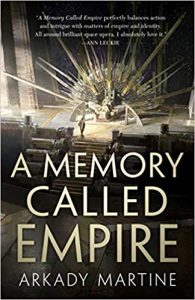 We begin not terribly long after Mahit Dzmare returned to her home, tiny, independent(ish) Lsel Station, after the tumultuous events of
We begin not terribly long after Mahit Dzmare returned to her home, tiny, independent(ish) Lsel Station, after the tumultuous events of  One last thought before this review rivals the book for length. I began
One last thought before this review rivals the book for length. I began 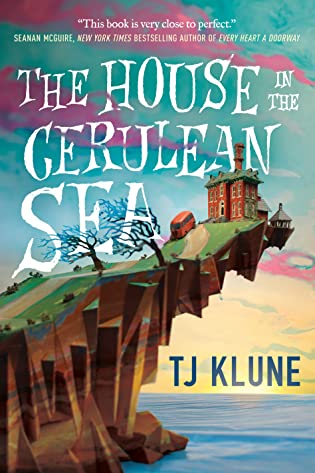 The House in the Cerulean Sea by
The House in the Cerulean Sea by 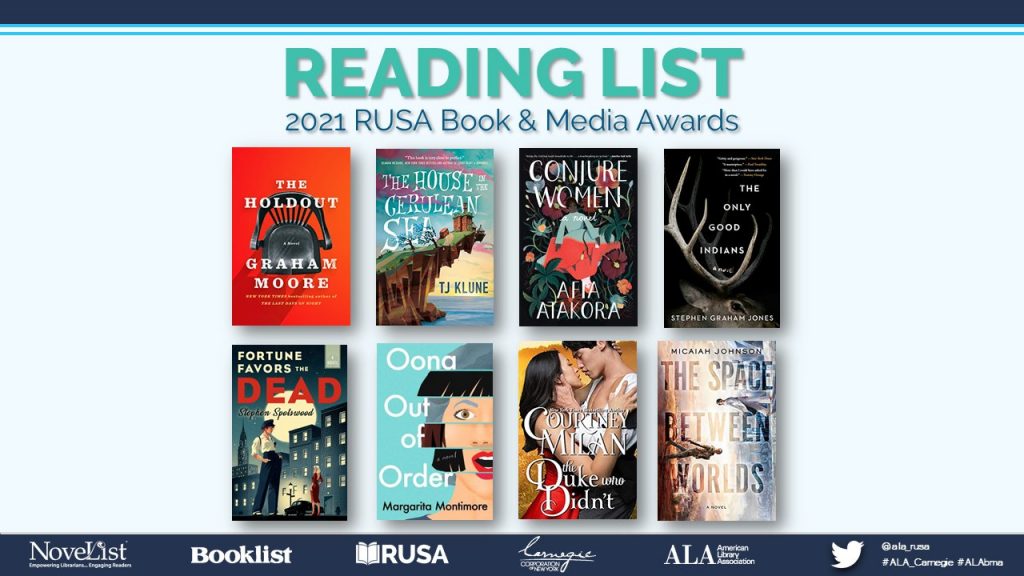
 Dune: The Duke of Caladan by
Dune: The Duke of Caladan by 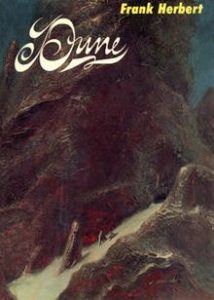
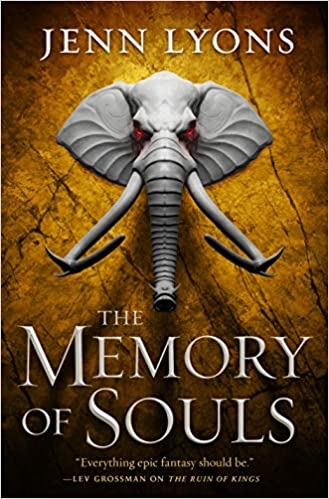 The Memory of Souls (A Chorus of Dragons, #3) by
The Memory of Souls (A Chorus of Dragons, #3) by 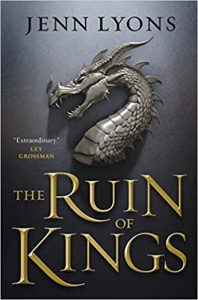 The Ruin of Kings
The Ruin of Kings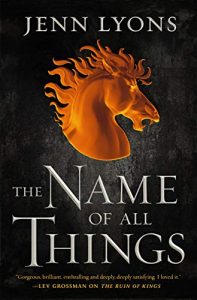 Escape Rating A++: Last year’s entry in this series,
Escape Rating A++: Last year’s entry in this series, 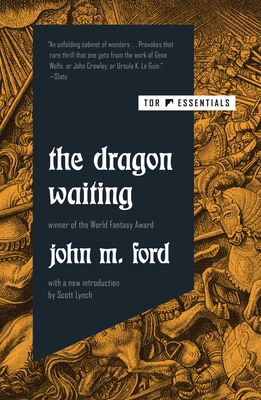 The Dragon Waiting by
The Dragon Waiting by 
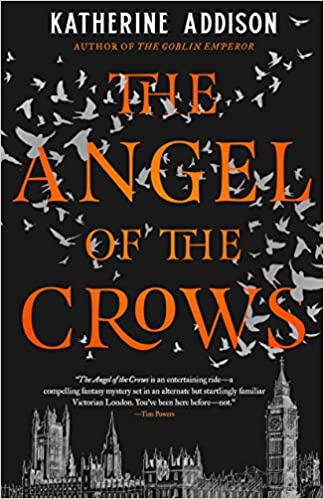 The Angel of the Crows by
The Angel of the Crows by 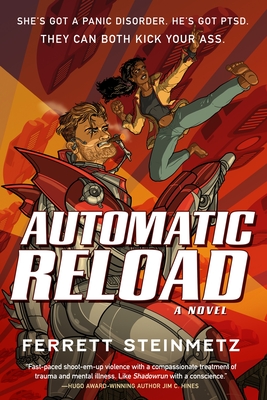 Automatic Reload by
Automatic Reload by 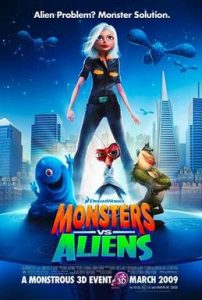 I’ll admit that I also kept seeing Silvia as the character in the movie
I’ll admit that I also kept seeing Silvia as the character in the movie 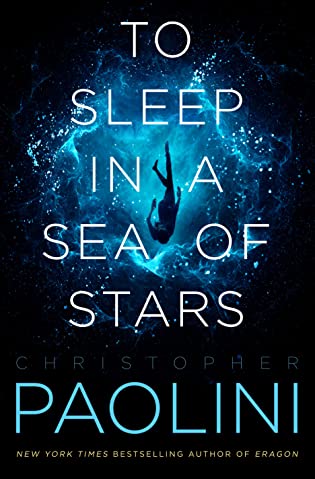 To Sleep in a Sea of Stars by
To Sleep in a Sea of Stars by  ABOUT THE AUTHOR:
ABOUT THE AUTHOR: